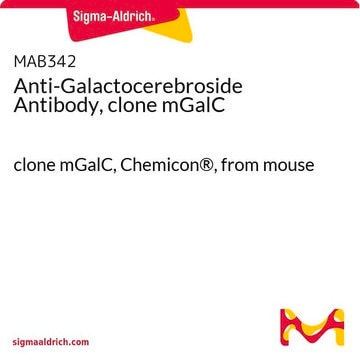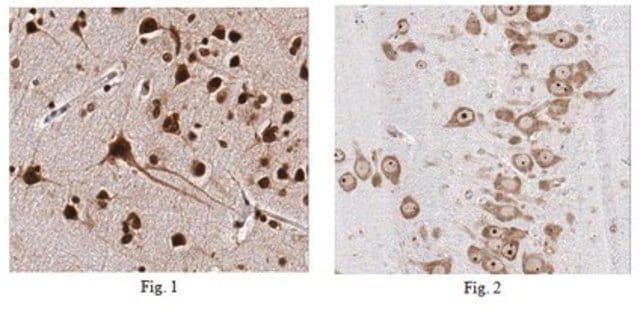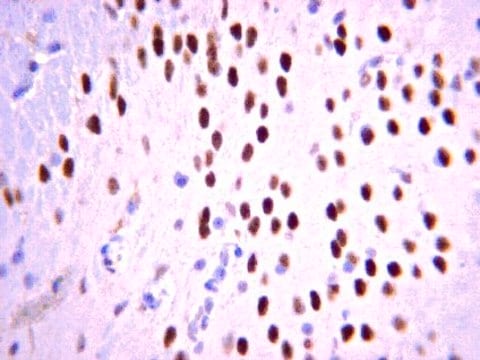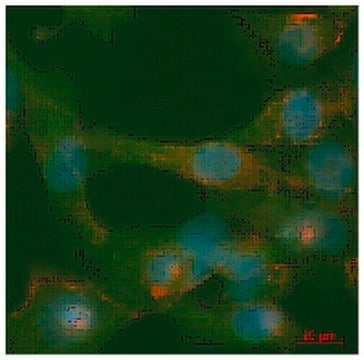推薦產品
生物源
rabbit
品質等級
抗體表格
affinity purified immunoglobulin
抗體產品種類
primary antibodies
無性繁殖
polyclonal
純化經由
affinity chromatography
物種活性
human, rat, mouse
製造商/商標名
Chemicon®
技術
immunocytochemistry: suitable
immunohistochemistry (formalin-fixed, paraffin-embedded sections): suitable
western blot: suitable
NCBI登錄號
UniProt登錄號
運輸包裝
dry ice
目標翻譯後修改
unmodified
基因資訊
human ... NEUROD2(4761)
一般說明
Neurogenic differentiation 2, also known as NEUROD2, is a human gene. This gene encodes a member of the neuroD family of neurogenic basic helix-loop-helix (bHLH) proteins. Expression of this gene can induce transcription from neuron-specific promoters, such as the GAP-43 promoter, which contain a specific DNA sequence known as an E-box. The product of the human gene can induce neurogenic differentiation in non-neuronal cells in Xenopus embryos, and is thought to play a role in the determination and maintenance of neuronal cell fates. Diseases associated with NEUROD2 are motor deficits, ataxia, and seizures. NEUROD2 expression is observed mainly in endovascular invasive cells.
特異性
Recognizes NeuroD 2 (NRDL, KW80), a Helix-loop-helix class of transcription factor.
免疫原
Synthetic peptide, amino acids 23-39 of human NeuroD2.
應用
Anti-NeuroD 2 Antibody detects level of NeuroD 2 & has been published & validated for use in IC, IH, IH(P) & WB.
Immunohistochemistry: 1:200-1:1,000.
Immunocytochemistry: 1:500 on PC12 cells
Western blot: 1:200-1:1,000 using ECL.
Optimal working dilutions must be determined by the end user.
Immunocytochemistry: 1:500 on PC12 cells
Western blot: 1:200-1:1,000 using ECL.
Optimal working dilutions must be determined by the end user.
Research Category
Neuroscience
Neuroscience
Research Sub Category
Developmental Neuroscience
Neuronal & Glial Markers
Developmental Neuroscience
Neuronal & Glial Markers
標靶描述
41 kDa
外觀
Affinity purified immunoglobulin. Precipitated antibody in a solution of 50% saturated ammonium sulfate and PBS containing no preservatives.
儲存和穩定性
Maintain unopened vial at -70°C for up to 6 months. Avoid repeated freeze/thaw cycles.
The antibody must be "rehydrated"prior to use:
To rehydrate/reconstitute the antibody, centrifuge the antibody vial at moderate speed (5,000 rpm) for 5 minutes to pellet the precipitated antibody product. Carefully remove the ammonium sulfate/PBS buffer solution and discard. It is not necessary to remove all of the ammonium
sulfate/PBS solution: 10 mL of residual ammonium sulfate solution will not effect the resuspension of the antibody. Do not let the protein pellet dry, as severe loss of antibody reactivity can occur.
Resuspend the antibody pellet in any suitable biological buffer, standard PBS or TBS (pH 7.3-7.5) are typical. Volumes required are not critical but it is suggested that the final antibody concentration be between 0.1 mg/mL and 1.0 mg/mL. For example, to achieve a 1 mg/mL concentration with 50 mg of precipitated antibody, the amount of buffer needed would be 50 mL.
Carefully add the liquid buffer to the pellet. DO NOT VORTEX. Mix by gentle stirring with a wide pipet tip or gentle finger-tapping. Let the precipitated antibody rehydrate for 1 hour at 4-25C° prior to use. Small particles of precipitated antibody that fail to resuspend are normal. Vials are overfilled to compensate for any losses.
The rehydrated antibody can be stored at:
2-8°C The rehydrated antibody solutions can be stored undiluted at 2-8C° for 2 months without any significant loss of activity. Note, the solution is not sterile, thus care should be taken if product is stored at 2-8C°.
-20°C For storage at -20°C, the addition of an equal volume of glycerol can be used, however, it is recommended that ACS grade or higher glycerol be used, as significant loss of activity can occur if the glycerol used is not of high quality.
-70°C For freezing, it is recommended that the rehydrated antibody solution be further diluted 1:1 with a 2% BSA (fraction V, highest-grade available) solution made with the rehydration buffer. The resulting 1% BSA/antibody solution can be aliquoted and stored frozen at -70C° for up to 6 months. Avoid repeated freeze/thaw cycles.
The antibody must be "rehydrated"prior to use:
To rehydrate/reconstitute the antibody, centrifuge the antibody vial at moderate speed (5,000 rpm) for 5 minutes to pellet the precipitated antibody product. Carefully remove the ammonium sulfate/PBS buffer solution and discard. It is not necessary to remove all of the ammonium
sulfate/PBS solution: 10 mL of residual ammonium sulfate solution will not effect the resuspension of the antibody. Do not let the protein pellet dry, as severe loss of antibody reactivity can occur.
Resuspend the antibody pellet in any suitable biological buffer, standard PBS or TBS (pH 7.3-7.5) are typical. Volumes required are not critical but it is suggested that the final antibody concentration be between 0.1 mg/mL and 1.0 mg/mL. For example, to achieve a 1 mg/mL concentration with 50 mg of precipitated antibody, the amount of buffer needed would be 50 mL.
Carefully add the liquid buffer to the pellet. DO NOT VORTEX. Mix by gentle stirring with a wide pipet tip or gentle finger-tapping. Let the precipitated antibody rehydrate for 1 hour at 4-25C° prior to use. Small particles of precipitated antibody that fail to resuspend are normal. Vials are overfilled to compensate for any losses.
The rehydrated antibody can be stored at:
2-8°C The rehydrated antibody solutions can be stored undiluted at 2-8C° for 2 months without any significant loss of activity. Note, the solution is not sterile, thus care should be taken if product is stored at 2-8C°.
-20°C For storage at -20°C, the addition of an equal volume of glycerol can be used, however, it is recommended that ACS grade or higher glycerol be used, as significant loss of activity can occur if the glycerol used is not of high quality.
-70°C For freezing, it is recommended that the rehydrated antibody solution be further diluted 1:1 with a 2% BSA (fraction V, highest-grade available) solution made with the rehydration buffer. The resulting 1% BSA/antibody solution can be aliquoted and stored frozen at -70C° for up to 6 months. Avoid repeated freeze/thaw cycles.
分析報告
Control
Cerebellum tissue
Cerebellum tissue
法律資訊
CHEMICON is a registered trademark of Merck KGaA, Darmstadt, Germany
免責聲明
Unless otherwise stated in our catalog or other company documentation accompanying the product(s), our products are intended for research use only and are not to be used for any other purpose, which includes but is not limited to, unauthorized commercial uses, in vitro diagnostic uses, ex vivo or in vivo therapeutic uses or any type of consumption or application to humans or animals.
Not finding the right product?
Try our 產品選擇工具.
儲存類別代碼
12 - Non Combustible Liquids
水污染物質分類(WGK)
WGK 2
閃點(°F)
Not applicable
閃點(°C)
Not applicable
分析證明 (COA)
輸入產品批次/批號來搜索 分析證明 (COA)。在產品’s標籤上找到批次和批號,寫有 ‘Lot’或‘Batch’.。
我們的科學家團隊在所有研究領域都有豐富的經驗,包括生命科學、材料科學、化學合成、色譜、分析等.
聯絡技術服務








